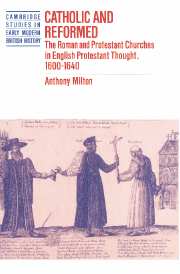Conclusion
Published online by Cambridge University Press: 31 October 2009
Summary
Writing in 1641, the parliamentarian pamphleteer Henry Parker believed that he had uncovered in the recent Laudian policies an intention ‘to new reforme that Reformation … which was begunne by Edw[ard] 6. and further matured by Queene Eliz[abeth] … The pretence was, that our Ancestors in the Reformation did depart too farre from Popery, out of favour to Puritanicall Calvin.’ This was, of course, a partisan interpretation – in their own terms, Laud and his followers were simply seeking to return the Church of England ‘to the rules of her first reformation’ Nevertheless, Parker's observation that the terms on which the Church of England had separated from Rome, and the relation of the English Church to the Churches of Calvin, had been under review, and that opinions differed in the present church, was true enough.
This book has argued that the religious developments and conflicts which took place during the early Stuart period were prompted in part by a gradual movement by Laudian divines away from an earlier, and perhaps more coherent, view of the Church of England and of its relations with the Churches of Rome and continental Protestantism.Previous divines had located the Church of England on the Protestant side of a polarized Christendom. The Laudians changed all this. Where previous writers had seen anti-popery as a positive form of religious expression, and as a crucial means of vindicating the Protestant credentials of the church's hierarchy, Laudians considered anti-popery to be a destabilizing force, which prompted a false set of religious priorities and encouraged the growth of a puritan-style word-based piety.
- Type
- Chapter
- Information
- Catholic and ReformedThe Roman and Protestant Churches in English Protestant Thought, 1600–1640, pp. 529 - 546Publisher: Cambridge University PressPrint publication year: 1995



